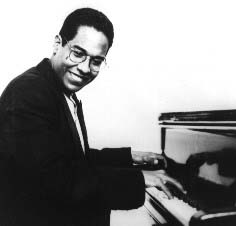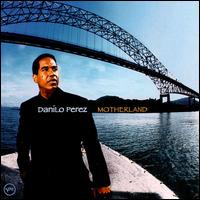

Courtesy of Danilo Perez

Verve Records
A
FIRESIDE CHAT WITH DANILO PEREZ
Fact, Danilo Perez is one talented piano player with chops to spare. Fact,
Perez has made a series of impressive albums on both Novus and what was
Impulse! and now GRP (part of Verve). Those are facts in my world. But
I do have some reservations when it comes to Perez. Most of all, I am
curious about the impact that Tommy LiPuma has had on his career. So I
asked him, along with his humble beginnings, the influence of Paquito
D'Rivera, and his latest record Motherland (due out any minute now), unedited
and in his own words.
FRED JUNG: Let's start from the beginning.
DANILO PEREZ: My father hooked me up, played and taught me about Cuban
music, tango. He loved Caruso, all these diverse types of music, classical
music. It was a huge diverse thing of stuff that I listened to. I feel
that jazz was born out of all that early on, European, African. I guess
the way that I was attracted to jazz was the freedom of expression. The
first time I heard it, which I was ten years old. My neighbor used to
play jazz records and that is when I got to hear the first taste of straight
ahead jazz. Also, there was a pianist Papo Lucca from Puerto Rico and
he was playing in solos, Bud Powell stuff, bebop lines. I really was attracted
to that from the beginning. I guess that is how I came to jazz. Jazz to
me is that freedom that the music allows for a lot of different expressions
to come together. I started playing percussion when I was three. I used
to go with my father and my father was very active and he was singing
around and I was bringing my bongos. He gave me little, tiny bongos and
I went with him everywhere playing. Every time he was playing, I was beside
him, in the afternoon though. I couldn't get into the clubs yet (laughing).
When I was seven, an uncle, who is dead now, gave me a little keyboard
and the first day that I was playing it, I would learn the piano solos
of these Cuban players.
FJ: Your initial exposure to percussion is conveyed in your approach to
the piano, which is percussive as well.
DANILO PEREZ: Exactly. When you play music, my father taught me, that
music is the harmony of a combination of sounds with rhythms. When you
play music, especially the piano, then you understand how to interact
with the drums in a certain way and the bass. I base my whole sound. I
would love to have a very lyrical approach, but with a percussive, beautiful
drum sound from Africa or something.
FJ: Influences?
DANILO PEREZ: At one point, very strongly, I got into Herbie Hancock and
then Keith Jarrett and Chick Corea, Duke Ellington, and of course, Thelonious
Monk.
FJ: Let's touch on your relationship with Paquito D'Rivera.
DANILO PEREZ: Well, it has been an incredible relationship because Paquito,
besides being a great musician, also gave me the first chance to practice
what I am doing right now, which is to be a leader. He gave me the first
break to do the musical directing. He gave me an idea of what to expect
if I ever got a band together. He also hooked me up with learning even
deeper about Venezuelan music, about the waltzes and how to play Brazilian.
We used to do it in the most authentic way and deal with the real issues
of every music. That lesson will stay with me forever.
FJ: And your work with Dizzy?
DANILO PEREZ: Dizzy was kind of an amplification of that because we were
so many diverse people from different cultures that I could see where
Paquito was coming from. Dizzy was just like the master of all of that
as far as putting it together and letting it flow.
FJ: Let's talk about your debut on the Impulse! label, Panamonk.
DANILO PEREZ: Before that, I did two records, the self-titled one, which
was basic and where I just let people know where all my influences came
from and then I did a very ambitious project after that called The Journey.
The Panamonk record for me was the record that made people relate to the
way I think, the way I hear. They could relate. It was a part of my life,
which I loved Monk and I felt that I found myself and I didn't have to
change when I played jazz or when I played Latin. I didn't have to adjust.
I left that I could organically move in and out between both of them.
Monk did that for me. That Panamonk record was where I could be myself
on the piano. It was the record that gave me my name playing the piano.
FJ: And the follow up, Central Avenue?
DANILO PEREZ: The Central Avenue record was the beginning of an experiment
that I wanted. I left from Monk and moved on to experimenting with music
from my country, Panamanian folk elements and something is the unification
of the blues in America, which I feel that there are different ways of
expressing it. That record for me was a door opening to the new record.
FJ: Let's touch on your latest, soon to be released album.
DANILO PEREZ: That recording for me is such a symbolic thing. It is a
series of experiences that I had. First, going to Cuba. Second, writing
a major piece for the Chicago Jazz Festival in 1999 and the other was
being around Wayne Shorter and playing with him. That had such an impact
on this recording, which I feel symbolized the true essence of fellowship.
It is a very symbolic record for me. It is a sister of The Journey in
a way. It deals with some issues that I started in The Journey.
FJ: Has the input of Tommy LiPuma been a positive one?
DANILO PEREZ: The first thing that is great about him is that the feeling
that he created about what I was doing. He really made me believe in what
I was doing. I remember the first time we met, he said, "You play your
ass off. But you have to make a record where people can relate to your
piano by itself." I was afraid to that, but he really came in and gave
me that final push that I needed to do that trio, Panamonk. And then,
working with him in the studio, my experience has been fantastic because
I don't have to worry about anything else. He lets me be as free as a
bird. With all the things that I have been putting together, he really
trusts me to do things, anything that I want to try. We go for it. I am
really blessed. He has taught me to make music on record that goes beyond
the jazz fans. My mother likes what I am doing right now. She doesn't
really understand jazz. He taught me the essence of going back to the
old records and not having these long solos and there is some things that
I have learned that are very valuable and that have helped me in my career.
FJ: Why did it take you reinterpreting Thelonious Monk's music for you
to get heard?
DANILO PEREZ: That is a great question actually. My feelings about that
is that certain people that do not know about Monk, they can't relate
it to Monk. In other words, there is a tendency of people who listen to
jazz to relate everything to something they already know, to give it some
kind of credit. When I did The Journey, which I think is a very important
record for me, they didn't really get it. It went past them. Now, they
are listening to it. But when I did Panamonk because I took Monk's music,
but at the end, they are finding out that what I am doing is very personal
and from my heart. I am not trying to play like Monk. Sometimes, you can't
avoid it, to be compared to or dissect the influences where you come from,
but I guess people need that so they can relate to you.
FJ: What do you miss most about Panama?
DANILO PEREZ: The food, Fred, the food. The water, the sea, the air, and
my family, very much so.
FJ: Your family lives in Panama?
DANILO PEREZ: Yeah, my mother, my father, they are there. My friends,
I miss a lot of things from there.
FJ: Your thoughts on the Latin music explosion.
DANILO PEREZ: I think it is a response to what jazz has gone through.
I think the thing that is missing from jazz is the dance and the body
movement and Latin is bringing it back. People want to dance. They want
to move to it. I think it is very healthy.
FJ: So Ricky Martin is a good thing?
DANILO PEREZ: I was referring more to the Buena Vista Social Club (laughing).
I have my doubts about certain things, but people's awareness to Latin,
if it opens the ears and minds to search a little bit more, I think it
will be good at the end. When those things about the craze of Latin music
comes in, everybody wants to turn Latin. Sometimes the music that they
get up there is less representative of Latin music, so we have to really
be careful about that so we don't kill that bird.
FJ: Since you are Latin, you don't have to pretend.
DANILO PEREZ: (Laughing) You know what happened now, Fred, for me, I spent
half of my life here and half of my life there and so I am a new generation
of a lot of people that are bilingual because there are many things I
miss here when I go home.
FJ: That diversity is reflected in your music.
DANILO PEREZ: I hope so because that is the essence.
Fred Jung is Jazz Weekly's Editor-In-Chief and thinks Danilo Perez oddly
resembles one CBS morning show host (B.G.) Comments? Email
Fred.